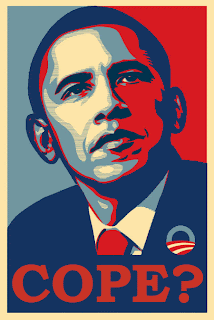 Taken from the Avocado Declaration
Taken from the Avocado Declaration When social justice, peace or civil rights movements become massive in scale, and threaten to become uncontrollable and begin to win over large numbers of people, the Democratic Party begins to shift and presents itself as a supposed ally. Its goal is always to co-opt the movement, demobilize its forces and block its development into an alternative, independent political force.
The Republican Party has historically acted as the open advocate for a platform which benefits the rule of wealth and corporate domination. They argue ideologically for policies benefiting the corporate rulers. The Republicans seek to convince the middle classes and labor to support the rule of the wealthy with the argument that "What's good for General Motors is good for the country," that what benefits corporations is also going to benefit regular people.
The Democratic Party is different. They act as a "broker" negotiating and selling influence among broad layers of the people to support the objectives of corporate rule. The Democratic Party's core group of elected officials is rooted in careerists seeking self-promotion by offering to the corporate rulers their ability to control and deliver mass support. And to the people they offer some concessions, modifications on the platform of the Republican Party. One important value of the Democratic Party to the corporate world is that it makes the Republican Party possible through the maintenance of the stability that is essential for "business as usual." It does this by preventing a genuine mass opposition from developing. Together the two parties offer one of the best frameworks possible with which to rule a people that otherwise would begin to move society towards the rule of the people (i.e. democracy).
The Republican Party has historically acted as the open advocate for a platform which benefits the rule of wealth and corporate domination. They argue ideologically for policies benefiting the corporate rulers. The Republicans seek to convince the middle classes and labor to support the rule of the wealthy with the argument that "What's good for General Motors is good for the country," that what benefits corporations is also going to benefit regular people.
The Democratic Party is different. They act as a "broker" negotiating and selling influence among broad layers of the people to support the objectives of corporate rule. The Democratic Party's core group of elected officials is rooted in careerists seeking self-promotion by offering to the corporate rulers their ability to control and deliver mass support. And to the people they offer some concessions, modifications on the platform of the Republican Party. One important value of the Democratic Party to the corporate world is that it makes the Republican Party possible through the maintenance of the stability that is essential for "business as usual." It does this by preventing a genuine mass opposition from developing. Together the two parties offer one of the best frameworks possible with which to rule a people that otherwise would begin to move society towards the rule of the people (i.e. democracy).
No comments:
Post a Comment